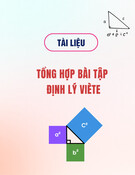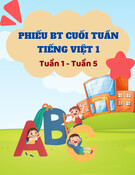
VOCABULARY SET 16: GAP
YEAR
Vocabulary:
1. absorb knowledge (collocation): ti p thu ki nế ế th cứ
2. an accelerating trend of sth (collocation): xu h ng tăngướ nhanh
3. appealing (adj): h pấ d nẫ
4. be better prepared for (collocation): đc chu n b t tượ ẩ ị ố h nơ
5. diverse cultural settings (np): môi tr ng văn hóa đaườ d ngạ
6. enrich oneself with (collocation): làm giàu b n thân v i gìả ớ đó
7. enter adulthood (collocation): m i tr ngớ ưở thành
8. firm determination (collocation): quy t tâm m nhế ạ mẽ
9. formal schooling (collocation): tr ng l p chínhườ ớ th ngố
10. physically demanding job (np): công vi c yêu c u cao v thệ ầ ề ể l cự
11. scarcity (n): s thi uự ế h tụ
12. tertiary education (np): giáo d c sau phụ ổ thông
Exercises:
Task 1: Write sentences from given cues. Make changes to the cues when needed.
1. There / accelerating trend / young people / travel abroad.
2. It / take / firm determination / complete / tertiary education.
3. By / read books / students / enrich oneself with / new knowledge.
4. Formal schooling / not / appealing / to / those / just / enter adulthood.
5. People / work abroad / absorb knowledge / diverse cultural settings.
6. Vietnam / physically demanding jobs / be / often / underpaid.
7. Trend / gap year / lead / scarcity / intellectual workforce.

8. Since I students / can / provide / working experiences / during / gap year / they / be better
prepared / future jobs.

9. High-schoolers / need / decide / whether / wish / pursue / tertiary education / not.
10. There / be / scarcity / qualified professionals / Vietnam / hospitality industry.
Task 2: Fill in the blanks with suitable words/phrases
Some students prefer to take a gap year between high school and university, to work or to
travel. Do the advantages of this outweigh the disadvantages?
In today's world, there has been an 1 of students taking a break from studying before
pursuing 2 . While this trend is beneficial to some extent, I am firmly of the opinion that its
shortcomings are weightier for the followers of this trend.
A gap year may enable students to 3 real-life experiences that are beneficial to their
future. These may include having a paid job, from which those who have just 4 may learn
many working skills, such as communication, teamwork and following orders. As a result, the youngsters
taking a gap year are 5 for their future jobs. Some may also travel the world and
6 of 7 and from different geographical contexts. In this globalised world, such
knowledge is essential for developing a successful career.
However, I strongly believe the disadvantages of taking a gap year for recent high-school graduates are
serious, far outweighing the advantages.The primary reason is that the young can be overwhelmed by the
unwanted difficulties of life outside of school campus. For example, a 8 can be exhausting
for most school-leavers. Another significant reason is that to the youngsters without 9 ,
earning money and living without the discipline of 10 could be more 11 than
returning to school after the gap year. Consequently, there could be a 12 of intellectual
workforce in the future as there will be fewer university students.
All in all, I personally believe that there are some serious drawbacks associated with a gap year that far
outweigh the potential gains.
268 words, written by Tu Pham

Key:
Task 1:
1. There has been an accelerating trend of young people traveling abroad.
2. It takes firm determination to complete tertiary education.
3. By reading books, students (can/may) enrich themselves with new knowledge.
4. Formal schooling may not be I is not appealing to those who have just entered adulthood.
5. People working abroad / who work abroad (can/may) absorb knowledge from diverse cultural settings.
6. In Vietnam, physically demanding jobs are often underpaid.
7. The trend of taking a gap year can / may lead to the scarcity of intellectual workforce.
8. Since students can/may/might be provided with working experiences during the gap year, they
can/may/might be better prepared for their future jobs.
9. High-schoolers need to decide whether they wish to pursue tertiary education or not.
10. There has been / is a scarcity of qualified professionals in Vietnamese hospitality industry.
Task 2:
Some students prefer to take a gap year between high school and university, to work or to
travel. Do the advantages of this outweigh the disadvantages?
In today's world, there has been an (1) accelerating trend of students taking a break from studying
before pursuing (2) tertiary education. While this trend is beneficial to some extent, I am firmly of the
opinion that its shortcomings are weightier for the followers of this trend.
A gap year may enable students to (3) enrich themselves with real-life experiences that are beneficial
to their future. These may include having a paid job, from which those who have just (4) entered
adulthood may learn many working skills, such as communication, teamwork and following orders. As a
result, the youngsters taking a gap year are (5) better prepared for their future jobs. Some may also
travel the world and (6) absorb knowledge of (7) diverse cultural settings and from different
geographical contexts. In this globalised world, such knowledge is essential for developing a successful
career.
However, I strongly believe the disadvantages of taking a gap year for recent high-school graduates are
serious, far outweighing the advantages. The primary reason is that the young can be overwhelmed by the
unwanted difficulties of life outside of school campus. For example, a (8) physically demanding job can
be exhausting for most school-leavers. Another significant reason is that to the youngsters without (9)
firm determination, earning money and living without the discipline of (10) formal schooling could be
more (11) appealing than returning to school after the gap year. Consequently, there could be a (12)
scarcity of intellectual workforce in the future as there will be fewer university students.
All in all, I personally believe that there are some serious drawbacks associated with a gap year that far
outweigh the potential gains.
268 words, written by Tu Pham





![Bài tập so sánh hơn và so sánh nhất của tính từ [kèm đáp án/mới nhất]](https://cdn.tailieu.vn/images/document/thumbnail/2025/20250808/nhatlinhluong27@gmail.com/135x160/77671754900604.jpg)
![Tài liệu tham khảo Tiếng Anh lớp 8 [mới nhất/hay nhất/chuẩn nhất]](https://cdn.tailieu.vn/images/document/thumbnail/2025/20250806/anhvan.knndl.htc@gmail.com/135x160/54311754535084.jpg)




![Tài liệu Lý thuyết và Bài tập Tiếng Anh lớp 6 [Mới nhất]](https://cdn.tailieu.vn/images/document/thumbnail/2025/20250802/hoihoangdang@gmail.com/135x160/18041754292798.jpg)




